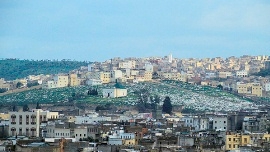WEDNESDAY, NOVEMBER 12
08.30-9.00
|
Coffee and Registration
|
OPENING SESSION
09.00-09.10
|
Welcoming Remarks, Marisela Montoliu Muñoz (World Bank, Director, Urban and Disaster Risk Management; Social, Urban, Rural & Resilience Global Practice)
|
09.10-10.30
|
Keynote Addresses, Edward Glaeser (Harvard, Fred and Eleanor Glimp Professor of Economics) and Paul Romer (Professor of Economics, NYU Stern School of Business and Director of the Urbanization Project)
Presentation 1: Cities in the Developing World (Edward Glaeser)
Presentation 2: The Power of the Grid (Paul Romer)
|
SESSION 1: STRUCTURAL CHANGE, URBANIZATION AND SUSTAINABLE DEVELOPMENT
Chair: Sudhir Shetty (World Bank, Chief Economist, East Asia and Pacific Region)
Discussant: Somik Lall (World Bank, Lead Economist, Urban, Rural and Social Development)
10.30-10.55
|
Malthusian Dynamics and the Rise of the Poor Megacity, Remi Jedwab (George Washington University)
|
10.55-11.20
|
Has Climate Change Promoted Urbanization in Sub-Saharan Africa? Vernon Henderson (LSE)
Presentation | Paper
|
11.20-11.45
|
Allocative Efficiency of Land and Other Factors of Production in India, Gilles Duranton (Wharton)
Presentation
|
11.45-12.00
|
Questions/discussion with audience
|
12.00-13.00
|
Lunch
|
SESSION 2: INFRASTRUCTURE, URBANIZATION AND SUSTAINABLE DEVELOPMENT
Chair: Pierre Guislain (World Bank, Senior Director, Transportation & ICT)
Discussant: Diego Puga (Center for Monetary and Financial Studies)
13.00-13.25
|
Transportation and Urban Growth in Chinese Cities, Nathaniel Baum-Snow (Brown)
Presentation
|
13.25-13.50
|
Highway to Success in India: The impact of the golden quadrilateral project for the location and performance of manufacturing, Ejaz Ghani (The World Bank)
Presentation | Paper
|
13.50-14.15
|
Hukou and Highways: The Impact of China’s Spatial Development Policies on Urbanization and Regional
Inequality, Maarten Bosker (Erasmus)
Presentation | Paper
|
14.15-14.30
|
Questions/discussion with audience
|
14.30-14.45
|
Coffee Break
|
SESSION 3: GOVERNANCE, URBANIZATION AND SUSTAINABLE DEVELOPMENT
Chair: Danny Leipziger (The Growth Dialogue)
Discussant: Paolo Avner (World Bank, Urban Economist, Social, Urban, Rural & Resilience Global Practice)
14.45-15.10
|
Capital Cities, Conflict, and Misgovernance: Theory and Evidence, Quoc-Anh Do (Sciences Po)
Presentation | Paper
|
15.10-15.35
|
Urbanization and Property Rights, Harris Selod (World Bank)
Presentation
|
15.35-16.00
|
Driving Restrictions that Work? Quito’s Pico y Placa Program, Paul Carillo (George Washington University)
Presentation | Paper
|
16.00-16.15
|
Questions/discussion with audience
|
16.15-16.30
|
Coffee Break
|
SESSION 4: URBANIZATION AND POVERTY REDUCTION - PANEL DISCUSSION
Chair and Closing Remarks: Marisela Montoliu Muñoz (World Bank, Director, Urban and Disaster Risk Management; Social, Urban, Rural & Resilience Global Practice)
16.30-17.30
|
Panelists: Gilles Duranton (Wharton), Vernon Henderson (London School of Economics), Marianne Fay (World Bank), Diego Puga (CEMFI), Paul Romer (New York University)
|
18.30-20.00
|
Cocktail reception and welcome speech by Stephen Smith (George Washington University) and Danny Leipziger (The Growth Dialogue) at George Washington University, Lindner Commons Room (6th Floor) of the Elliott School of International Affairs, 1957 E St. N.W. (at the intersection of E and 19th Streets, on E Street), Washington, DC
The Buzz in Cities: New Economic Thinking (The Growth Dialogue)
|
(5 minutes by walk, map here)

Last Updated: Nov 18, 2014


.png)

.jpg)








.jpg)


.jpg)



.jpg)
